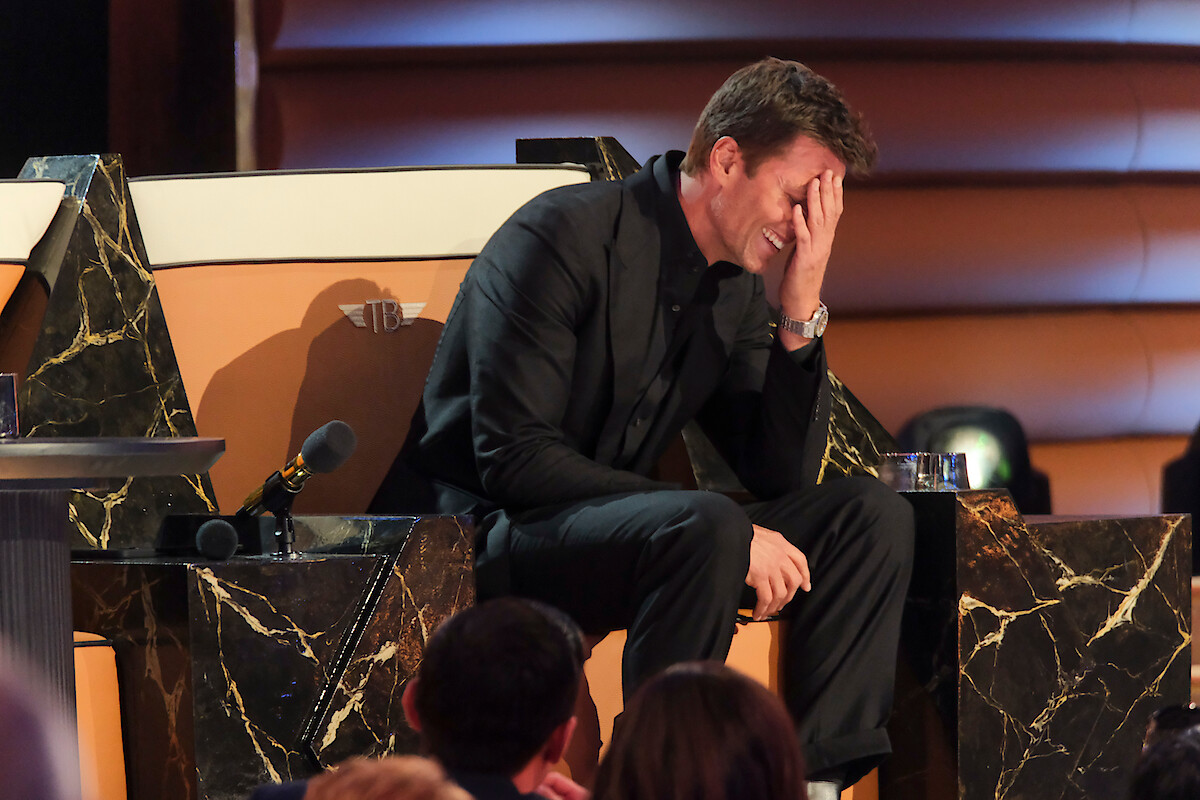When chatter turns to big events, particularly those featuring well-known figures, a common thought that pops up for many folks is just how much money might be involved. It's a natural curiosity, really, to wonder about the financial side of things, especially when someone as famous as Tom Brady takes the stage for a public gathering like a roast. People often ponder the size of the sum, thinking about what a "large amount" truly means in that kind of situation, you know?
The very idea of "how much" can spark quite a bit of discussion, as a matter of fact. It leads us to consider what makes a payment seem "great in quantity" or "substantial." Is it a figure that makes your jaw drop, or perhaps a sum that simply feels like a fair deal for someone of his standing? We often hear the word "much" thrown around, and it has a few different shades of meaning, which we can explore, sort of, in this context.
This curiosity about "how much did Tom Brady get paid for the roast" brings us to a closer look at the word "much" itself. It's a word we use all the time, but its meaning can shift a bit depending on what we're talking about, or, you know, the specific situation. Understanding what "much" implies, whether it's a "significant" sum or something else entirely, helps us get a clearer picture of what people are really asking when they pose that kind of question.
- Charlize Theron One Night Stand
- Terrel Williams Now
- Carly Jane Topless
- Tatum Oneal Partner
- Is Hilary Farr Married
Table of Contents
- The Meaning of "Much" in Financial Terms
- What Does "Much" Imply About How Much Did Tom Brady Get Paid For The Roast?
- Is It a Large Amount or a Far Larger Amount Than Needed?
- How Much Did Tom Brady Get Paid For The Roast - Considering Uncountable Nouns
- When "Much" Becomes Significant, Important, or Major
- The Opposite of "Much" - Little and Insignificant
- How Much Did Tom Brady Get Paid For The Roast - The Subjective View
- Using "Much" in a Sentence - Examples and Context
The Meaning of "Much" in Financial Terms
When we talk about "how much did Tom Brady get paid for the roast," the word "much" is doing a lot of heavy lifting, isn't it? It's typically about a "great in quantity, amount, extent, or degree." So, people are really asking if the payment was a truly big one, a sum that stands out. It's not just a small figure; it's something that suggests a considerable scale, a pretty hefty sum, you know? This word, "much," gives us a way to talk about the size of things, whether it's money or something else entirely, like, say, effort or time.
The idea behind "much" in this situation is usually that we're dealing with something quite substantial. It's about a "large amount or to a large degree." If someone received "much" for an event, it certainly implies a payment that isn't just average, or, you know, run-of-the-mill. It's meant to convey a sense of considerable value, something that makes you pause and think about the scale of it all. This helps us understand the general feeling behind the question of "how much did Tom Brady get paid for the roast."
Consider the different ways "much" can be used, and you start to see its flexibility. It's an adjective or an adverb, and it consistently points to a "large quantity, extent, or degree." So, if we apply that to money, we're talking about a payment that has a considerable size, a rather significant number of dollars. It's not about a precise figure, necessarily, but about the overall sense of a large sum, which, as a matter of fact, is what most people are curious about when they ask about this kind of thing.
- Roblox Creator Dashboard
- Asx1coм
- Teach Me First Manga Honey
- Is George Reeves Related To Christopher Reeves
- Pathivara Temple Trek Details
What Does "Much" Imply About How Much Did Tom Brady Get Paid For The Roast?
When someone asks "how much did Tom Brady get paid for the roast," the word "much" is really the heart of the inquiry, isn't it? It implies a curiosity about whether the payment was "great in quantity, amount, extent, or degree." So, people are not just asking for a number; they're asking if that number represents a truly significant sum, a pretty big chunk of change. This suggests a payment that stands out, something that isn't just an ordinary fee, but rather something quite substantial for a public appearance.
The use of "much" in this context suggests that the expected answer is not small. It's leaning towards the idea of "a large amount or to a large degree." If the payment was "much," it would mean it was considerable, perhaps even eye-popping for some folks. This way of phrasing the question, you know, using "much," points to a general expectation of a high value, a sum that reflects the celebrity's drawing power and the nature of the event. It's about the perceived size of the compensation, really.
Furthermore, when something is described as "much," it often carries a sense of importance or significance. So, in asking "how much did Tom Brady get paid for the roast," there's an underlying thought that the amount could be "significant, important, major, big, historic, substantial, meaningful, eventful." It's about a payment that could be noteworthy, something that makes headlines or becomes a talking point, which, you know, is often the case with such high-profile figures and events. It’s a way of gauging the impact of the payment itself.
Is It a Large Amount or a Far Larger Amount Than Needed?
The question of "how much did Tom Brady get paid for the roast" can sometimes go beyond just "a large amount." It can also hint at whether the payment was "a far larger amount of something than you want or need." This is where the perception of "much" can get a bit tricky, isn't it? For some, any payment to an already wealthy person might seem "too much," regardless of the actual figure. It's about perspective, really, and what someone considers to be an excessive sum.
When we think about "much" in this way, it introduces a subjective element to the discussion. What one person considers "a large amount" might be seen by another as "a far larger amount than needed." This depends on individual values and what one believes is fair compensation for a public figure. So, the question isn't just about the numerical value, but about the *perception* of that value, particularly when it comes to "how much did Tom Brady get paid for the roast," which, you know, can vary quite a bit from person to person.
This nuance of "much" highlights that the inquiry isn't always purely factual. It can carry an emotional or judgmental tone. If someone feels the payment was "too much," it suggests a sense of excess, perhaps even extravagance. It's a feeling that the amount goes beyond what is reasonable or necessary for the task at hand. This is a common way people use the word "much" when discussing high-profile earnings, as a matter of fact, particularly when the recipient is already quite well-off.
How Much Did Tom Brady Get Paid For The Roast - Considering Uncountable Nouns
It's interesting to think about how "much" typically pairs with uncountable nouns. When we ask "how much did Tom Brady get paid for the roast," we're talking about money, which, you know, is generally treated as an uncountable concept in English. We don't say "many moneys"; we say "much money" or "a lot of money." This linguistic detail helps frame the question, focusing on the overall bulk or volume of the payment rather than individual units.
The rule is that "much is now generally used with uncountable nouns." So, when discussing the payment, we're considering it as a single, large pool of funds, rather than counting individual bills or coins. This reinforces the idea of a significant, undivided sum. It's about the total quantity of the payment, not a count of separate items, which, you know, is pretty typical when talking about earnings for a public appearance.
For example, you'd say, "I have a lot of money," rather than "I have much money" in positive contexts, as "much" is "widely avoided" there. However, in questions like "how much did Tom Brady get paid for the roast," or in negative statements, "much" fits perfectly. This grammatical point, in a way, shapes how we even phrase the inquiry, directing our attention to the overall magnitude of the financial reward, a rather interesting linguistic quirk, really.
When "Much" Becomes Significant, Important, or Major
Beyond just quantity, the word "much" can also mean something is "significant, important, major, big, historic, substantial, meaningful, eventful." So, when people ask "how much did Tom Brady get paid for the roast," they might also be wondering if the payment itself was a significant event, a truly major financial transaction. It's not just about the number, but about the impact and importance of that number, which, you know, can be quite considerable.
A payment described as "much" in this sense implies that it carries weight, that it's not just a trivial sum. It suggests that the amount paid is noteworthy, perhaps even setting a new benchmark for such events. This perspective adds another layer to the question of "how much did Tom Brady get paid for the roast," moving beyond simple arithmetic to consider the broader implications of the compensation, which, you know, can be pretty far-reaching in the world of celebrity earnings.
This meaning of "much" also ties into the idea of a "meaningful" or "eventful" sum. It's a payment that leaves an impression, that contributes to the overall narrative of the event or the celebrity's career. It's a figure that people will remember and discuss, perhaps because it's so substantial. So, the inquiry isn't just about the raw figure, but about its perceived importance in the grand scheme of things, a rather fascinating aspect of how we talk about money, really.
The Opposite of "Much" - Little and Insignificant
To truly grasp "how much did Tom Brady get paid for the roast," it helps to consider the opposite of "much." The antonyms for "much" include words like "little, small, slight, trivial, minor, insignificant, unimportant, negligible." If the payment were described using these words, it would suggest a sum that didn't make waves, something that barely registered, which, you know, is probably not what most people expect for a celebrity of his stature.
If the payment was "little," it would mean it was of small quantity or degree. This would be quite contrary to the general expectation when discussing a high-profile figure like Tom Brady. A "small" or "trivial" payment would imply that the financial aspect was not a major talking point, that it was, in a way, almost an afterthought. This helps us understand why the question "how much did Tom Brady get paid for the roast" almost always implies a search for a large figure.
The contrast helps highlight the common assumption that such an appearance would command a significant fee. Nobody is asking "how little did Tom Brady get paid for the roast" because the expectation is that the amount would be substantial. The very phrasing of the question, using "much," sets up the anticipation of a considerable sum, something far from "insignificant" or "unimportant," which, you know, is pretty clear from the way people talk about these things.
How Much Did Tom Brady Get Paid For The Roast - The Subjective View
The concept of "how much did Tom Brady get paid for the roast" is, in many ways, quite subjective. What one person considers "much" can be quite different from another's perspective. A sum that seems "great in quantity" to one individual might appear merely "adequate" to someone else, particularly if they are used to dealing with very large figures. It's about personal reference points, really, and what one's own experiences suggest about what constitutes a big payment.
This personal interpretation means that even if a specific figure were known, the debate over whether it was "much" would likely continue. For instance, if the campus "wasn't much to look at," that implies a subjective assessment of its visual appeal, not an objective measure. Similarly, a payment being "much" depends on who is doing the looking and what their financial background is. It's not a fixed point, you know, but rather a flexible idea.
The varying definitions of "much" from "a large amount" to "a far larger amount of something than you want or need" really underscore this subjectivity. What constitutes "too much" is entirely personal. So, the question "how much did Tom Brady get paid for the roast" is not just seeking a number, but also inviting a judgment on whether that number aligns with one's own idea of what a "great" or "significant" payment should be, which, you know, can lead to all sorts of interesting conversations.
Using "Much" in a Sentence - Examples and Context
To truly grasp "how much did Tom Brady get paid for the roast," it helps to see how the word "much" behaves in various sentences. We've seen that "much is used as an adjective or adverb, but it always means a large quantity, extent, or degree." This means it sets the stage for a big answer, whether it's describing the amount directly or modifying a verb to show a high degree of something, which, you know, is pretty straightforward.
For example, when "something hurts very much," it's understood to be "very painful." The "much" here emphasizes the intensity. Similarly, when a friend says a gift is "very much" appreciated, it conveys a strong feeling of gratitude. Applying this to "how much did Tom Brady get paid for the roast," the "much" signals that we're talking about a payment that carries significant weight or intensity in terms of its size, a rather telling use of the word, really.
The numerous meanings of "much" listed in dictionaries, some of which are now obsolete, show just how rich and varied its usage can be. From "great in quantity, measure, or degree" to implying "a large quantity or amount," the word consistently points to a substantial scale. So, when people ask about Tom Brady's roast payment, they're tapping into this core meaning of "much" to understand the sheer size of the financial exchange, a concept that's, you know, quite fascinating in its simplicity and depth.
This discussion has explored the various ways we can think about "how much did Tom Brady get paid for the roast" by looking closely at the word "much" itself. We've considered its meaning as a "great in quantity" or "large amount," and how it can also suggest something "significant" or "important." We've also touched on the subjective nature of "much," and how its use with uncountable nouns shapes the question. The focus has been on understanding the different facets of "much" as a concept, drawing directly from its definitions and usage, rather than providing specific figures.
- Marjorie Bach Young
- Karen Fisher Biography
- Openai Chatgpt Plus Payment Iran
- Tatum O Neal Partner
- When Is Shedletskys Birthday



